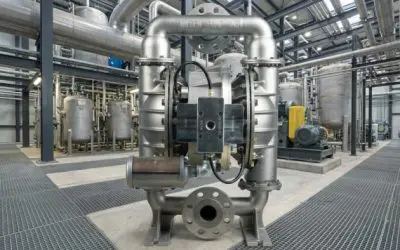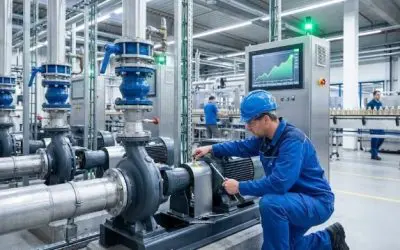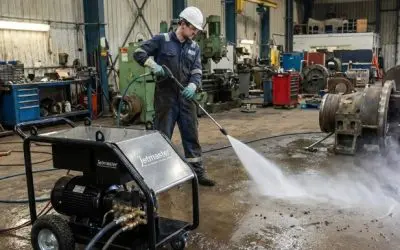
In modern industrial and commercial thermal systems, operational success depends heavily on pump performance. Two critical systems that require reliable pump support are the boiler system and the HVAC (Heating, Ventilation, and Air Conditioning) system.
Although they serve different functions, both systems require pumps that can operate efficiently, consistently, and withstand high pressure and temperature. Therefore, understanding the differences, similarities, and key selection criteria for pumps used in boiler and HVAC systems is essential for engineering teams, facility managers, and project consultants.
What Is the Difference Between Boiler Pumps and HVAC Pumps?
While both types of pumps transfer fluids, their specific purposes determine distinct technical requirements:
1. Boiler Pump (Boiler Feed Pump)
The main function of a boiler pump is to supply high-pressure water into the boiler so it can be converted into steam.
Typical Applications: Hot water or steam systems, industrial plants, power generation (such as thermal power stations), and large building or hospital boilers.
Key Requirements:
These pumps must withstand extremely high pressure (to overcome boiler operating pressure) and very high temperatures. Their design and materials must be specialized to ensure safety and consistent water feed performance.
2. HVAC Pump (Circulation Pump)
The HVAC pump circulates hot or chilled water throughout the building’s network to regulate temperature.
Typical Applications: Circulating fluids to chillers, cooling towers, AHUs (Air Handling Units), and FCUs (Fan Coil Units).
Key Requirements:
The primary focus is efficient circulation, stable operation, and energy efficiency. HVAC pumps typically operate at medium pressure and across a wide temperature range (from chilled water to hot water circulation).
General Criteria for Selecting Pumps for Boiler & HVAC Systems
When choosing a pump for either boiler or HVAC applications, the following technical considerations are crucial to ensure efficiency, reliability, and system longevity:
-
Working Pressure (Head):
Ensure the pump can generate sufficient pressure. Boiler feed pumps require a more robust design than HVAC circulation pumps. -
Fluid Temperature:
The pump’s materials must tolerate the system’s operating temperature. Boiler systems typically demand higher temperature tolerance. -
Flow Capacity:
The water flow rate must match the system’s total heating or cooling load requirements. -
Pump Materials:
To resist heat, corrosion, and abrasion, common materials include cast iron, bronze, or stainless steel (SS). -
Seal Type:
The use of mechanical seals or gland packing is critical to prevent leakage, especially in high-pressure and high-temperature applications. -
Spare Part Availability:
Easy access to spare parts ensures long-term maintenance and minimizes downtime. -
Motor Compatibility:
Matching the motor’s RPM and power to the pump curve guarantees optimal energy efficiency.
Can an HVAC Pump Be Used as a Boiler Pump?
The short answer: YES — but only in specific cases.
HVAC or hot water circulation pumps can be used for:
-
Circulating hot water from the boiler to distribution units (such as AHU or FCU).
-
Closed-loop boiler systems operating at medium pressure.
-
Industrial hot water heating systems that do not require extreme pressure.
However, they are NOT suitable for:
-
Acting as a Boiler Feed Pump that directly feeds high-pressure boilers (e.g., in power plants or heavy industries).
Such applications require specialized pumps like multistage pumps or plunger pumps designed for extreme pressure operation.
EUROFLO Pump Solutions: Dual Approach for HVAC and Boiler Systems
EUROFLO offers a robust range of pumps engineered to handle both applications — emphasizing high-temperature fluid transfer, efficient heating/cooling circulation, and medium to high-pressure performance.
1. ESC Series – Horizontal Split Case Pump
Key Features:
Single-stage design with double suction impeller and center-mounted bearings to reduce vibration and increase MTBF (Mean Time Between Failure).
Applications:
Suitable for HVAC & cooling tower circulation, boiler water heating systems, power generation, and large-scale hot water distribution.
2. EU Series – End Suction Centrifugal Pump
Key Features:
Compact design with a back pull-out (BPO) feature for easy maintenance and compliance with EN733/DIN 24255 standards.
Applications:
Ideal for boiler hot water circulation, HVAC heating and cooling loops, pressure boosting, and general industrial fluid handling.
By selecting pumps made from heat-resistant materials, pressure-tolerant designs, and flexible installation options, you can ensure maximum energy efficiency, system reliability, and installation lifespan.
The ESC and EU Series from EUROFLO, distributed by Winston Indonesia, provide a reliable and durable solution for both boiler and HVAC system requirements.



